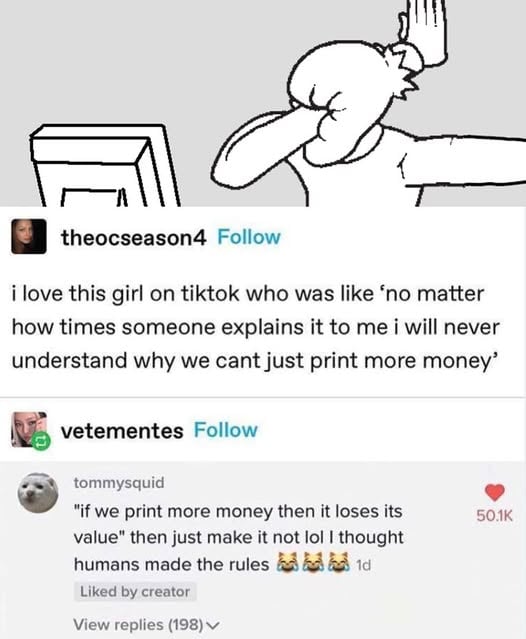this post was submitted on 08 Feb 2025
473 points (96.6% liked)
Curated Tumblr
5374 readers
28 users here now
For preserving the least toxic and most culturally relevant Tumblr heritage posts.
Here are some OCR tools to assist you in transcribing posts:
-
FOSS Android Recs per u/[email protected]: 1 , 2
Don't be mean. I promise to do my best to judge that fairly.
founded 2 years ago
MODERATORS
you are viewing a single comment's thread
view the rest of the comments
view the rest of the comments

Currency divides the value of an economy. It can only represent that total value.
... but printing more would fix problems if all the new stuff went to normal people. It would give them a larger share of their economy's total value, at the expense of billionaires. The usual trouble is that those rich fucks also get all the new money, doubling down on how they have all of the fucking money.
there is not an item of currency attached to every asset on earth..There is vastly more real asset value than there is currency.
Modern currency is liquid float to help facilitate transactions among items having real value.
Currency itself has only one fundamental value - it's the only thing that can be used to settle taxes. This gives it a lot of exchange value - people will accept it in exchange for real value because they know there are always people needing to pay taxes, including themselves.
Governments accepted crops. Long after the invention of currency, governments still took their cut in wheat. What kind of money is a peasant going to have? All the king's horses eat grain. This obsession with tax is a weirdly libertarian lens on a history that's mostly anthropology.
Fungibility is the fundamental value of currency. Gift economies and informal debt only work if you see the same people on the regular. Anywhere too populous or chaotic requires a medium of exchange - some stand-in for that liquid value. And since it's a pain in the ass to assess variabile quality, all pressure encourages commodification, and only caring about quantity.
Currency is almost inevitable from these pressures. Even functional goods like "knife money" became symbolic coins. If the point is saying, here is a knife, not necessarily a knife we both agree has suitable innate worth, then the idea of a knife is sufficient.
I mean how would taxes explain the rai stones from Yap? There's these giant cartoon wheels that change hands without moving. People just agree, sure, that one belongs to Seema now.
I'm not arguing in favour of libertarianism, it's nonsense. I'm pointing out some basic tenets of credit money. In whatever form currency is, it's always tied to state power over law and taxes. The rai stones are an OK example of it.
https://neweconomicperspectives.org/modern-monetary-theory-primer.html
How.
States are the reason everyone uses currency. States are fundamentally an army that wields its power to pay itself, and currency is a huge force multiplier for projecting power (and therefore paying itself).
The problem with crops is that they're hard to transport, so if you and your army try to go conquer some other land, and if the army still insists on being paid upfront (it does), then you have to haul the food, using people/animals that eat some of the food they're hauling. Now you're facing sharp logistical limitations analogous to the 'tyranny of the rocket' equation, where carrying food requires more food to feed the mules, and carrying that extra mule food requires more mules which requires more mule food.
Currency solves that whole issue. The state forces the farmers to pay tax via currency, and so the farmers need to sell their crops for currency that they can pay tax with, and so now the soldiers can buy food from the farmers with the currency the state pays them. Carrying currency along with the army during a march is a relatively simple problem.
And sure, farmers could trade with currency even if the state didn't exist, but ultimately farmers don't actually want to trade with others - they want to be self-sufficient (within their local community), and what few trades they do actually require (e.g. buying salt, if they live inland), can still be done with crops. And do note that salt is incredibly value-dense.
Also, currency is mostly useless for farmers - what they'd mostly want to buy is food, during a famine. But if there's a famine, everyone is hoarding food instead of selling it. So the currency is useless to buy food. Which means other farmers would be even less willing to sell the food they're hoarding. It's like the opposite of "don't look down".